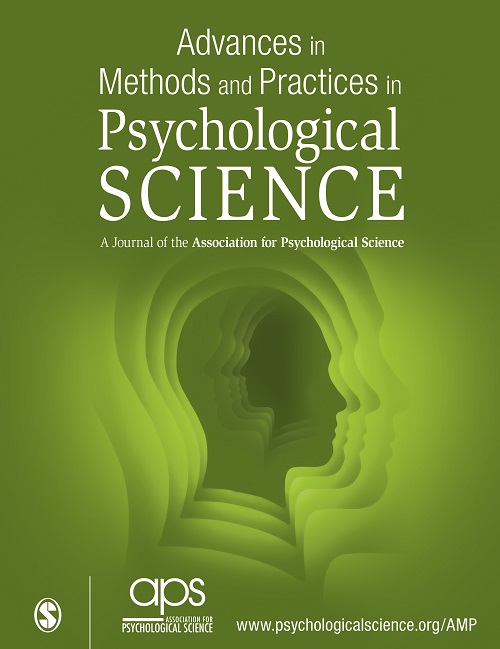A Conceptual Framework for Investigating and Mitigating Machine-Learning Measurement Bias (MLMB) in Psychological Assessment
IF 15.6
1区 心理学
Q1 PSYCHOLOGY
Advances in Methods and Practices in Psychological Science
Pub Date : 2021-07-30
DOI:10.1177/25152459211061337
引用次数: 18
Abstract
Given significant concerns about fairness and bias in the use of artificial intelligence (AI) and machine learning (ML) for psychological assessment, we provide a conceptual framework for investigating and mitigating machine-learning measurement bias (MLMB) from a psychometric perspective. MLMB is defined as differential functioning of the trained ML model between subgroups. MLMB manifests empirically when a trained ML model produces different predicted score levels for different subgroups (e.g., race, gender) despite them having the same ground-truth levels for the underlying construct of interest (e.g., personality) and/or when the model yields differential predictive accuracies across the subgroups. Because the development of ML models involves both data and algorithms, both biased data and algorithm-training bias are potential sources of MLMB. Data bias can occur in the form of nonequivalence between subgroups in the ground truth, platform-based construct, behavioral expression, and/or feature computing. Algorithm-training bias can occur when algorithms are developed with nonequivalence in the relation between extracted features and ground truth (i.e., algorithm features are differentially used, weighted, or transformed between subgroups). We explain how these potential sources of bias may manifest during ML model development and share initial ideas for mitigating them, including recognizing that new statistical and algorithmic procedures need to be developed. We also discuss how this framework clarifies MLMB but does not reduce the complexity of the issue.一个调查和缓解心理评估中机器学习测量偏差(MLMB)的概念框架
考虑到在使用人工智能(AI)和机器学习(ML)进行心理评估时对公平性和偏见的严重担忧,我们从心理测量的角度提供了一个调查和减轻机器学习测量偏见(MLMB)的概念框架。MLMB被定义为经过训练的ML模型在亚组之间的差分功能。当训练的ML模型为不同的亚组(例如,种族、性别)产生不同的预测得分水平,尽管他们对潜在的兴趣结构(例如,个性)具有相同的基本事实水平时,MLMB在经验上表现出来,和/或当模型在亚组之间产生差异的预测准确性时。由于ML模型的开发涉及数据和算法,因此有偏差的数据和算法训练偏差都是MLMB的潜在来源。在基本事实、基于平台的构建、行为表达和/或特征计算中,数据偏差可能以亚组之间不等价的形式出现。当算法在提取的特征和基本事实之间的关系中具有非等价性时(即,算法特征在子群之间被差异地使用、加权或变换),可能会出现算法训练偏差。我们解释了这些潜在的偏差来源在ML模型开发过程中是如何表现出来的,并分享了缓解这些偏差的初步想法,包括认识到需要开发新的统计和算法程序。我们还讨论了该框架如何澄清MLMB,但不降低问题的复杂性。
本文章由计算机程序翻译,如有差异,请以英文原文为准。
求助全文
约1分钟内获得全文
求助全文
来源期刊
CiteScore
21.20
自引率
0.70%
发文量
16
期刊介绍:
In 2021, Advances in Methods and Practices in Psychological Science will undergo a transition to become an open access journal. This journal focuses on publishing innovative developments in research methods, practices, and conduct within the field of psychological science. It embraces a wide range of areas and topics and encourages the integration of methodological and analytical questions.
The aim of AMPPS is to bring the latest methodological advances to researchers from various disciplines, even those who are not methodological experts. Therefore, the journal seeks submissions that are accessible to readers with different research interests and that represent the diverse research trends within the field of psychological science.
The types of content that AMPPS welcomes include articles that communicate advancements in methods, practices, and metascience, as well as empirical scientific best practices. Additionally, tutorials, commentaries, and simulation studies on new techniques and research tools are encouraged. The journal also aims to publish papers that bring advances from specialized subfields to a broader audience. Lastly, AMPPS accepts Registered Replication Reports, which focus on replicating important findings from previously published studies.
Overall, the transition of Advances in Methods and Practices in Psychological Science to an open access journal aims to increase accessibility and promote the dissemination of new developments in research methods and practices within the field of psychological science.

 求助内容:
求助内容: 应助结果提醒方式:
应助结果提醒方式:


